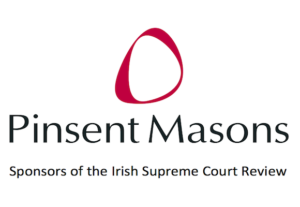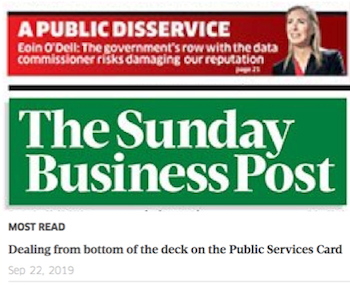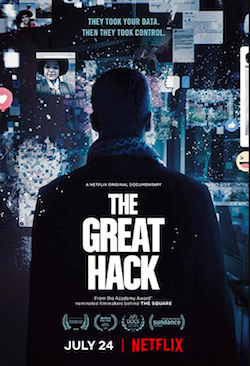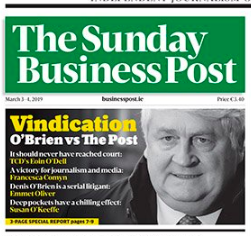 The Irish Supreme Court Review (ISCR), hosted by the School of Law, Trinity College Dublin, and sponsored by Pinsent Masons, is a forum for in-depth analysis of the functions and jurisprudence of the Supreme Court of Ireland.
The Irish Supreme Court Review (ISCR), hosted by the School of Law, Trinity College Dublin, and sponsored by Pinsent Masons, is a forum for in-depth analysis of the functions and jurisprudence of the Supreme Court of Ireland.
The second annual ISCR conference will be held on Saturday 12 October 2018 in Trinity College Dublin.
All are welcome to attend; the fee (inclusive of materials, tea & coffee breaks, and light lunch) is €35.00, or €15:00 (concession for students, pensioners and the unwaged); and registration is essential (via here or here).
SCHEDULE
09:00 Registration: Edmund Burke Lecture Theatre, Room 1008, Arts Building, Trinity College Dublin (map)
09:30 Keynote: Chair: Mark Bell (Regius Professor of Law, and Head of the School of Law, Trinity College Dublin)
Imelda Maher (Sutherland Professor of European Law, and Dean of Law, University College Dublin) “The Supreme Court’s Treatment of EU Law”
10:30 Tea & coffee
11:00 Panel 1: Chair: Mary Finlay Geoghegan (Judge of the Supreme Court, 2017 to 2019)
Noel McGrath (University College Dublin) ACC Loan Management v Rickard [2019] IESC 29 (09 May 2019)
Fiona de Londras (University of Birmingham) P v Minister for Justice and Equality [2019] IESC 47 (31 May 2019)
Des Ryan (Trinity College Dublin) Nano Nagle School v Daly [2019] IESC 63 (31 July 2019)
Áine Ryall (University College Cork) Data Centres, Masterplans and Environmental Assessment Obligations: Fitzpatrick v An Bord Pleanála [2018] IESC 60 (05 December 2018) and [2019] IESC 23 (11 April 2019)
12:30 Light Lunch
13:30 Panel 2: Chair: Iseult O’Malley (Judge of the Supreme Court)
Liz Heffernan (Trinity College Dublin) Statutory Presumptions Affecting the Burden of Proof: Director of Public Prosecutions v Forsey [2018] IESC 55 (08 November 2018)
Mark Coen (University College Dublin Sweeney v Ireland [2019] IESC 39 (28 May 2019)
David Prendergast (Trinity College Dublin) Director of Public Prosecutions v Brown [2018] IESC 67 (21 December 2018)
14:45 Tea & coffee
15:00 Panel 3: Chair: to be confirmed
Fergus Ryan (Maynooth University) P v Judges of the Circuit Court [2019] IESC 26 (30 April 2019)
Brian Murray SC (Law Library, Dublin) Kerins v McGuinness [2019] IESC 11 (27 February 2019), O’Brien v Clerk of Dáil Éireann [2019] IESC 12 (05 March 2019), and Kerins v McGuinness [2019] IESC 42 (29 May 2019) In my view, the Government’s unjustified defiance of the DPC imperils Ireland’s tech reputation; and I argue in an OpEd in today’s Sunday Business Post (sub req’d) (update: you can download it from the links in update 3 below) that this unseemly standoff must be resolved as quickly as possible, before irreversible damage is done to our international standing as a good location in which international tech companies can establish their European headquarters: The government is clinging to its legal advice on the PSC data fiasco. It needs to admit it was wrong and change course immediately At the end of last week, the media was full of stories that Google had been “Fined $170 Million for Violating Children’s Privacy on YouTube” (that’s a headline from the New York Times; see also, for example, NPR | BBC | RTÉ | Silicon Republic). In this post, I want to sketch the legal background to, and consequences of, this fine; and, at the end, I will say a few words about the equivalent position in Europe. In the US, the Children’s Online Privacy Protection Act of 1998 (15 USC §§ 6501–6506; hereafter: COPPA), and the Children’s Online Privacy Protection Rule (16 CFR § 312; hereafter: the COPPA Rule) made under it, regulate unfair and deceptive acts and practices in connection with the collection and use of personal information from and about children on the internet. In particular, 15 USC §§ 6502(b)(A) COPPA, and 16 CFR § 312.3 COPPA Rule, require the operator of any website or online service directed to children that collects personal information from children, or the operator of a website or online service that has actual knowledge that it is collecting personal information from a child, (i) to provide notice on the website of what information is collected from children by the operator, how the operator uses such information, and the operator’s disclosure practices for such information; and Giving further effect to the second paragraph here, 16 CFR § 312.5(b)(1) COPPA Rule provides An operator must make reasonable efforts to obtain verifiable parental consent, taking into consideration available technology. The Book of Kells is one of the great treasures in the Old Library in Trinity College Dublin. It is a manuscript of the Four Gospels in Latin based on the Vulgate of St Jerome. It was written and illuminated in the ninth century, probably in part in a monastery on the island of Iona in Scotland, and in part in a monastery in Kells, Co Meath, Ireland. Though a great medieval treasure, it contains some typographical errors. For example, the Gospel of Luke has an extra ancestor in the genealogy of Jesus (Luke 3:26; pictured left). It seems that the scribe read “qui fuit mathathiae” as “qui fuit mathath | iae” and thus wrote “qui fuit mathath” (the first line in the picture on the left) and “qui fuit iae” (the second line in the picture). Even Homer nods. I was reminded of this when I recently read an article by Tom Lamont about the effects of electronic typos: an SMS misdirected to a wrong mobile phone number (leading to a marriage!); a satnav directed to Rom (in Germany) rather than Rome (in Italy); a jet from Sydney directed to 15 degrees 19.8 minutes east (and landing in Melbourne) rather than 151 degrees 9.8 minutes east) (bound for Kuala Lumpur).… Veteran Irish journalist Vincent Browne presented the late-night political talk show Tonight with Vincent Browne on what was then TV3 from 2007 to 2017 (the programme is now The Tonight Show hosted by Ivan Yates and Matt Cooper on Virgin Media One). His famously waspish and curmudgeonly demeanour permitted him to adopt a technophobic persona, dismissing the considerable (almost cult) online following as “the twitter machine” (the twitter hashtag was #vinb; from small beginnings, it grew to become a vital part of the show; and nostalgia still drives some traffic). Those halcyon days of Irish political twitter came back to me reading a review of Richard Seymour’s The Twittering Machine (Indigo Press, 2019) by Peter Conrad in The Observer the weekend before last. Here are some extracts, which give a sense of the review and a flavour of the book, as well as an explanation both of the book’s title and of the Klee painting (above left): A stark polemic argues that social media may have unleashed an age of nihilism from which there is little hope of escape Reacting to Thomas More’s coinage of “utopia” as the “perfect state”, from the Greek “eu” meaning “good”, and “topos” meaning “place”, John Stuart Mill coined “dystopia” as the “frightening state”, from the Greek “dys” meaning “bad”, and (again) “topos” meaning “place”. But, whilst “dystopia” is perfect to describe a “frightening state” and its frightened society, it is not particularly apt to describe a “frightening company” and its frightened society. Indeed, we don’t really have the words for when a corporate society goes bad; “dystopia” and “dystopian” have been pressed into service (even in the context of reviewing The Great Hack: “Watching this film, you literally start to wonder if history has been warped towards a sickening dystopia”); but the warped society in that movie is very different to the warped society in classic dystopian fiction (such as, to take the obvious example, Orwell’s 1984).… Emmet Oliver: A man named Sue. The eagerness with which Denis O’Brien has taken legal actions in recent years shows the urgent need for a comprehensive overhaul of Ireland’s libel laws. Francesca Comyn: A refusal to wave the white flag. At its core, The Sunday Business Post’s victory over tycoon Denis O’Brien in the High Court was a broader win for journalism and the Irish media. Susan O’Keeffe: Defamation ruling a victory for freedom of the press. Even when journalists are sure of their facts, they take a risk once they tangle with power, a risk worth taking because it’s important for journalism and democracy. Eoin O’Dell: O’Brien’s case should never have reached the High Court.…
The sooner the government changes tack on the #psc, the better for Ireland’s international reputation – updated
 On Tuesday of this week, belatedly and with very bad grace, the Department of Employment Affairs and Social Protection published the Report of the Data Protection Commission (DPC) on the Public Services Card (#PSC), which concluded that the government’s implementation of the PSC infringed data protection legislation. The government has refused to accept or comply with the Commission’s findings, and has instead, for reasons beyond understanding, gone to war with the DPC on this issue.
On Tuesday of this week, belatedly and with very bad grace, the Department of Employment Affairs and Social Protection published the Report of the Data Protection Commission (DPC) on the Public Services Card (#PSC), which concluded that the government’s implementation of the PSC infringed data protection legislation. The government has refused to accept or comply with the Commission’s findings, and has instead, for reasons beyond understanding, gone to war with the DPC on this issue.
…
Dealing from bottom of the deck on the Public Services Card
… The DPC’s report is very clear; its fundamental conclusions will undoubtedly survive legal challenge; and the government will eventually be as surely taken to task in the courts in Dublin and Luxembourg as it has been his week in the court of public opinion.The legal basis of the US$170m fine on Google for YouTube’s infringement of children’s privacy

(ii) to obtain verifiable parental consent for the collection, use, or disclosure of personal information from children; …
…
The legal effects of some butterfly-effect typos; including mistaken offers, and restitution of mistaken payments
Klee/Seymour; or, The digital dysaguria of The Twittering Machine
…
The Twittering Machine by Richard Seymour review – our descent into a digital dystopia
Technology, as Richard Seymour says, always boasts of possessing superhuman powers, which is why it arouses our wary paranoia.The Great Hack and the dysaguria of Cambridge Analytica
 The Great Hack has just dropped on Netflix (IMDB | Rotten Tomatoes | wikipedia | poster left). It is a documentary that explores “how a data company named Cambridge Analytica came to symbolize the dark side of social media in the wake of the 2016 US presidential election”. Much has already been written about the Cambridge Analytica scandal (eg ICO here and here (pdfs) | Carole Cadwalladr in The Guardian), and a great deal more will be written as the movie is reviewed in the coming days. I don’t propose to add to those torrents here. Rather, I simply want to observe that there is a word for a company that symbolizes the dark side of social media.
The Great Hack has just dropped on Netflix (IMDB | Rotten Tomatoes | wikipedia | poster left). It is a documentary that explores “how a data company named Cambridge Analytica came to symbolize the dark side of social media in the wake of the 2016 US presidential election”. Much has already been written about the Cambridge Analytica scandal (eg ICO here and here (pdfs) | Carole Cadwalladr in The Guardian), and a great deal more will be written as the movie is reviewed in the coming days. I don’t propose to add to those torrents here. Rather, I simply want to observe that there is a word for a company that symbolizes the dark side of social media. Not archiving the .ie domain, and the death of new politics
 About this time last year, the Government lost some votes on important issues as the Bill that became the Data Protection Act 2018 (also here) was at Committee Stage in the Dáil. Writing on this blog, I described this as an example of new politics making for interesting times. Rather magnanimously, they did not seek to reverse these defeats; at the last stage of the Bill, the Minister confirmed that it was “not [his] intention to revisit the putting of the amendment in any other form”. In the intervening year, much has changed – for one thing, we are a year closer to a general election, commentators forecast that the next budget in October will be this Government’s last, and there is speculation that the Taoiseach may even call a snap election earlier than that. All of this means that the detente of new politics is breaking down. There can be no surer sign of this than that the Government is no longer magnanimously prepared to accept parliamentary defeats, and will reverse them if it can. There was a shameful example of this arrogance earlier this week in the Seanad, during the Report Stage debate on the Copyright and Other Intellectual Property Law Provisions Bill 2018.…
About this time last year, the Government lost some votes on important issues as the Bill that became the Data Protection Act 2018 (also here) was at Committee Stage in the Dáil. Writing on this blog, I described this as an example of new politics making for interesting times. Rather magnanimously, they did not seek to reverse these defeats; at the last stage of the Bill, the Minister confirmed that it was “not [his] intention to revisit the putting of the amendment in any other form”. In the intervening year, much has changed – for one thing, we are a year closer to a general election, commentators forecast that the next budget in October will be this Government’s last, and there is speculation that the Taoiseach may even call a snap election earlier than that. All of this means that the detente of new politics is breaking down. There can be no surer sign of this than that the Government is no longer magnanimously prepared to accept parliamentary defeats, and will reverse them if it can. There was a shameful example of this arrogance earlier this week in the Seanad, during the Report Stage debate on the Copyright and Other Intellectual Property Law Provisions Bill 2018.…Denis O’Brien’s case against the Sunday Business Post should never have reached the High Court – updated
 In today’s Sunday Business Post (as trailed on the front cover, here; element left),
In today’s Sunday Business Post (as trailed on the front cover, here; element left), I have an OpEd (sub req’d) an OpEd (sub req’d) (now here) in which I argue that O’Brien’s case should never have reached the High Court, and that the Department of Justice needs to publish its review of the Defamation Act as soon as possible (you can download it below). It’s part of a bumper collection of articles on the case (spread here and here):
